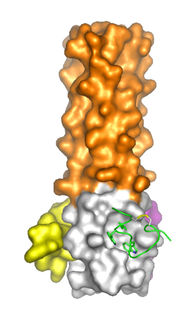Raptor Pharmaceutical Licenses Intellectual Property Related to Huntington's Disease
Raptor Pharmaceutical Corp. announced that the Company has acquired an exclusive worldwide license to intellectual property related to the potential treatment of Huntington's disease from the Weizmann Institute of Science in Israel and Niigata University in Japan. In addition, Raptor has added Professor Lawrence Steinman, M.D., an inventor on the Weizmann patent, to its Advisory Board.
The Weizmann and Niigata patents cover the use of transglutaminase inhibitors, a class of molecules chemically similar to cysteamine, in the potential treatment of Huntington's Disease and other neurological disorders. These patents add to Raptor's portfolio of intellectual property related to its programs utilizing DR Cysteamine, Raptor's proprietary formulation of delayed-release cysteamine bitartrate, licensed exclusively, with worldwide rights, from the University of California, San Diego.
Ted Daley, President of Raptor's Clinical Division, stated, "This exclusive license covering the Weizmann and Niigata patents significantly strengthens and expands our proprietary position as the compounds claimed in these patents are closely related to our lead clinical compound DR Cysteamine. Additionally, this strategic move to enhance our intellectual property position coincides with our planned clinical trial of DR Cysteamine in collaboration with The Centre Hospitalier Universitaire d'Angers ("CHU d'Angers") for the potential treatment of Huntington's Disease, as well as our future plans to explore potential treatments for multiple indications utilizing cysteamine and DR Cysteamine."
Raptor plans to initiate a Phase II clinical trial this summer of DR Cysteamine in patients with Huntington's Disease under a collaboration agreement with CHU d'Angers of France. The Company is also developing DR Cysteamine as a potential treatment for nephropathic cystinosis ("cystinosis") and non-alcoholic steatohepatitis ("NASH").
Topics
Organizations
Other news from the department science

Get the life science industry in your inbox
By submitting this form you agree that LUMITOS AG will send you the newsletter(s) selected above by email. Your data will not be passed on to third parties. Your data will be stored and processed in accordance with our data protection regulations. LUMITOS may contact you by email for the purpose of advertising or market and opinion surveys. You can revoke your consent at any time without giving reasons to LUMITOS AG, Ernst-Augustin-Str. 2, 12489 Berlin, Germany or by e-mail at revoke@lumitos.com with effect for the future. In addition, each email contains a link to unsubscribe from the corresponding newsletter.






















































